- Home
- »
- Beauty & Personal Care
- »
-
Tea-based Skin Care Market Size, Industry Report, 2030GVR Report cover
![Tea-based Skin Care Market Size, Share & Trends Report]()
Tea-based Skin Care Market (2025 - 2030) Size, Share & Trends Analysis Report By Product (Facial Care, Body Care, Others), By Distribution Channel (Offline, Online), By Region (North America, Europe, APAC, Latin America, MEA), And Segment Forecasts
- Report ID: GVR-3-68038-670-7
- Number of Report Pages: 80
- Format: PDF
- Historical Range: 2018 - 2023
- Forecast Period: 2025 - 2030
- Industry: Consumer Goods
- Report Summary
- Table of Contents
- Interactive Charts
- Methodology
- Download FREE Sample
-
Download Sample Report
Tea-based Skin Care Market Summary
The global tea-based skin care market size was estimated at USD 258.9 million in 2024 and is projected to reach USD 399.5 million by 2030, growing at a CAGR of 7.5% from 2025 to 2030. Increasing consumer awareness about the benefits of natural and organic skincare ingredients is a major driver, with tea-based products gaining popularity for their antioxidant and anti-inflammatory properties.
Key Market Trends & Insights
- In terms of region, Asia Pacific was the largest revenue generating market in 2024.
- Country-wise, France is expected to register the highest CAGR from 2025 to 2030.
- In terms of segment, facial care accounted for a revenue of USD 192.6 million in 2024.
- Body care is the most lucrative product segment, registering the fastest growth during the forecast period.
Market Size & Forecast
- 2024 Market Size: USD 258.9 Million
- 2030 Projected Market Size: USD 399.5 Million
- CAGR (2025-2030): 7.5%
- Asia Pacific: Largest market in 2025
The rising demand for clean and sustainable beauty products is also propelling the market, as consumers seek formulations free from synthetic chemicals and preservatives.
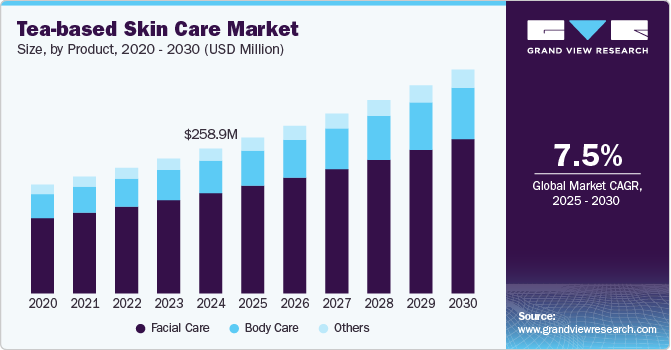
The growing influence of social media and beauty influencers highlighting the benefits of tea-based skincare further boosts consumer interest and adoption. Additionally, the expansion of the wellness and self-care trend is encouraging consumers to invest in products that promote healthy and radiant skin. Innovations in product development and the introduction of new tea-based formulations, such as green tea, black tea, and white tea extracts, are enhancing the appeal of the tea-based skin care industry.
Tea-infused skincare products can benefit various skin types. For dry skin sensitive to pollution, cigarette smoke, and UV rays, containing hydrating green tea, white tea, and revitalizing matcha tea. Oily skin prone to acne benefits from anti-bacterial and anti-inflammatory extracts of matcha, kombucha, or white tea, which detoxify the skin. Black tea plumps mature skin, green tea retains moisture, and white tea reduces fine lines.
Consumer Survey & Insights
Earthraga, a direct-to-consumer brand specializing in natural and organic skincare products, was surveyed in 2023 to explore consumer views on sustainability in the skincare industry. The findings reveal that 95.4% of respondents incorporate sustainable products into their skincare routines. Additionally, 84.6% of participants highly value eco-friendly practices in skincare, indicating a significant shift towards environmentally conscious choices. Notably, 47% of respondents are willing to pay extra for products with sustainable ingredients, reflecting the perceived value of eco-friendly options. Regarding spending habits, 36.5% of participants prefer budget-friendly skincare products. The survey also highlights that 59.6% of respondents consider skincare products clean when they contain organic and natural ingredients, while 50.1% prioritize cruelty-free choices. Furthermore, 49.2% emphasize the importance of official labels, and 44% prefer USDA Organic certification. Lastly, 40.6% of participants use organic skincare to address acne-related concerns.
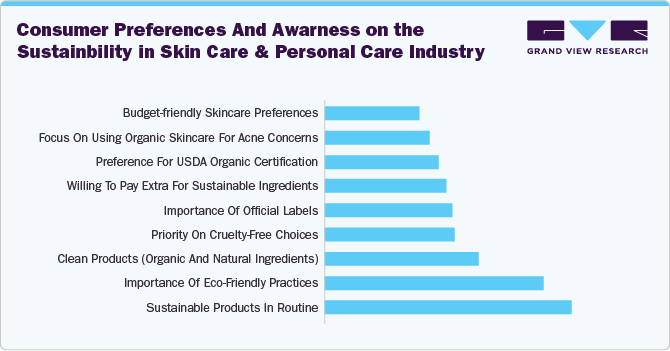
A survey revealed that 63% of consumers consider clean beauty to be "extremely or very important" when selecting cosmetics, indicating a strong preference for environmentally conscious brands. Additionally, 81% of shoppers believe that brands should actively reduce plastic packaging, although nearly half (47.42%) are content with recyclable plastic for their preferred products. Beyond clean ingredients, consumers are increasingly evaluating a brand's overall environmental and social impact. Despite 54% of consumers being committed to preventing their favorite brands' products from ending up in landfills, over half express skepticism about the authenticity of clean beauty claims. The survey highlights that 70% of shoppers investigate a company's eco-credentials, whereas only 15% admit to never examining a brand's sustainability commitment. These findings underscore the growing importance of comprehensive eco-friendly practices and transparency in the beauty industry.
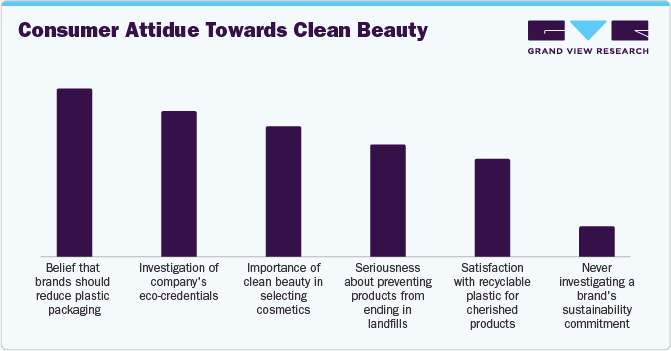
Product Insights
Tea-based facial care accounted for a revenue share of 69.2% in 2024 driven by the increasing awareness about the benefits of tea-based ingredients, such as their antioxidant and anti-inflammatory properties. Consumers are seeking natural and effective solutions to address common skin concerns like aging, acne, and hyperpigmentation, making tea-based facial care products highly desirable. Additionally, the growing trend of self-care and wellness is encouraging consumers to invest in high-quality skincare products that promote healthy and radiant skin. The expansion of product offerings by major brands, including facial cleansers, toners, masks, and serums infused with tea extracts, is further supporting the segment's growth.
For instance, in July 2022, BYROE, a luxury superfood skincare collection, launched three tea-infused products: English Breakfast Tea Treatment Essence, Hibiscus Tea Glow Mist, and Rose Tea Eye Cream. Inspired by the nutritious benefits of salads, BYROE founder Amy Roe sees tea as a natural extension of the brand. The English Breakfast Tea Treatment Essence contains black tea, natural caffeine, kombucha, Vitamins C and B, Pro-Vitamin B5, and squalene. This formula is clinically proven to improve skin moisture by 132.33% immediately after application.
Demand for tea-based body care is expected to grow at a CAGR of 7.9% over the forecast period. Increasing consumer awareness about the benefits of natural ingredients, including tea extracts, is significantly boosting demand for tea-based body care products. These products, known for their antioxidant, anti-inflammatory, and soothing properties, are becoming popular for addressing a variety of skin concerns and enhancing overall skin health. The rising trend of wellness and self-care is encouraging consumers to invest in high-quality body care products that promote relaxation and rejuvenation. Additionally, the expansion of product lines by major skincare brands, offering lotions, creams, scrubs, and body washes infused with tea extracts, is making these products more accessible to a broader audience.
Distribution Channel Insights
Sales of tea-based skin care through offline accounted for a revenue share of 78.1% in 2024. Traditional brick-and-mortar stores, including department stores, specialty skincare shops, and pharmacies, remain popular among consumers who prefer to physically inspect and select their skincare products. The tactile experience of testing products, sampling, and receiving personalized advice from sales associates enhances the shopping experience and builds consumer trust. Additionally, the strategic locations and established customer base of offline retail outlets contribute to their strong market presence. Seasonal promotions, in-store events, and exclusive product launches also attract more customers, further boosting sales through offline channels.
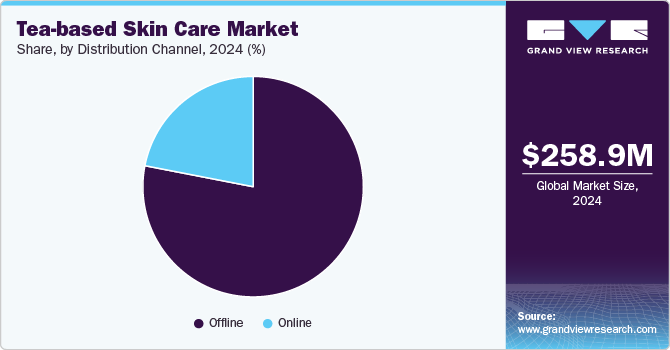
Sales of tea-based skin care through online channels are set to grow at a CAGR of 8.1% from 2025 to 2030. The increasing popularity of e-commerce platforms and online shopping is making it more convenient for consumers to purchase skincare products from the comfort of their homes. The wide variety of products available online, often accompanied by detailed descriptions, reviews, and ratings, helps consumers make informed purchasing decisions. Additionally, the expanding reach of digital marketing and social media advertising is effectively targeting a broader audience, boosting online sales. The availability of exclusive online discounts, promotions, and subscription services further incentivizes consumers to shop online.
Regional Insights
The tea-based skin care industry in Asia Pacific accounted for 33.6% of the global market revenue in 2024. The region's longstanding tradition of tea consumption and its well-documented health benefits have naturally extended to tea-based skincare products. Countries such as China, Japan, and South Korea, known for their innovative beauty and skincare industries, have significantly contributed to the popularity and development of tea-infused skincare items. The increasing consumer awareness about the natural and anti-aging properties of tea polyphenols, which are effective in combating skin issues such as inflammation and oxidative stress, has fueled demand. Additionally, the rising disposable incomes and improving living standards in the region have led consumers to invest more in premium and natural skincare products. The strong presence of local and international skincare brands offering a wide range of tea-based products has further bolstered the market's growth.
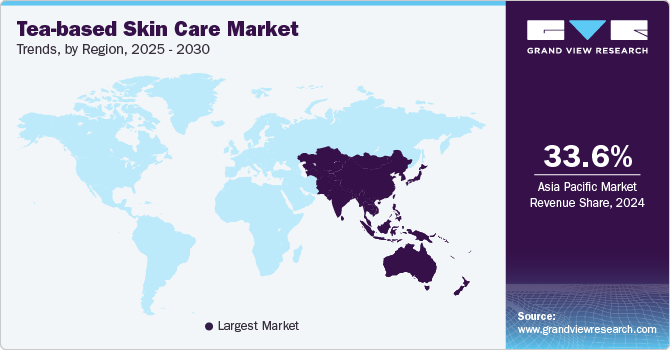
In January 2024, Teaology launched in Watsons, Singapore. Embracing the Clean BeauTEA philosophy, Teaology's patented Tea Infusion Skincare technology replaces water in cosmetics with real tea infusion, preserving the antioxidants in tea leaves. This innovation results in formulations with 0% water and 100% tea infusion, promoting clean ingredients, sustainable packaging, and clinically tested efficacy. Committed to vegan and cruelty-free practices, Teaology is certified by B CORP, reinforcing its dedication to ethical and sustainable beauty.
North America Tea-based Skin Care Market Trends
The tea-based skin care industry market in North America accounted for 26.6% of the global market revenue in 2024. The increasing focus on natural and clean beauty products is a significant driver, with consumers seeking formulations free from synthetic chemicals and preservatives. The health and wellness movement, emphasizing preventive skincare and overall well-being, is propelling the demand for tea-based products known for their antioxidant and rejuvenating properties. The strong influence of social media and digital marketing is raising awareness and driving consumer interest in tea-based skincare. Additionally, the region's well-developed retail infrastructure, including both online and offline channels, facilitates easy access to a wide range of skincare products. The presence of leading beauty brands and the continuous introduction of innovative tea-based formulations further support market growth in North America.
In March 2024, INNISFREE partnered with renowned artist Steven Harrington to create "THE ISLE ADVENTURE," a collection inspired by Green Tea Rainforest, Healing Pond, and Green Enzyme. This collaboration merges nature-powered skincare with Harrington's unique aesthetics, showcasing INNISFREE's dedication to sustainability and effectiveness. The collection includes an enhanced Green Tea Seed Hyaluronic Serum, offering 72 hours of deep hydration, the Retinol Cica Repair Ampoule, and the Vitamin C Green Tea Enzyme Brightening Serum, providing comprehensive skincare solutions for various skin needs.
U.S. Tea-based Skin Care Market Trends
The U.S. tea-based skin care industry is expected to grow significantly over the forecast period. The rise of wellness and self-care trends, particularly among younger demographics, is encouraging consumers to invest in products that promote healthy and radiant skin. Social media and beauty influencers play a crucial role in educating consumers about the antioxidant and anti-inflammatory properties of tea extracts, further driving market growth. Additionally, the expanding availability of tea-based skincare products through online platforms and specialty stores ensures wide consumer access. The presence of established skincare brands and innovative startups in the U.S. market also contributes to the dynamic growth of tea-based skincare products in the region.
In January 2025, Corrective Skin launched a new skincare line in the U.S., previously available only on CorrectiveSkin.com. This family-owned brand from Salt Lake City, UT, now offers its products nationwide. The launch includes five bestsellers: Tea Tree Scrub, Vitamin C Serum, Epidermal Growth Factor (EGF) Healing Cream, Cranberry Cleanser, and Glycolic Brightening Solution.
Europe Tea-based Skin Care Market Trends
The tea-based skin care industry in Europe is set to grow at a CAGR of 8.0% over the forecast period. European consumers are increasingly seeking sustainable and eco-friendly skincare solutions, aligning with the growing trend of conscious consumerism. The rise of clean beauty and the preference for natural antioxidants in skincare formulations are further propelling the market. Additionally, the influence of European beauty standards and trends, often emphasizing natural and healthy skin, is driving the adoption of tea-based products. The presence of numerous prestigious skincare brands and the growing popularity of organic and artisanal beauty products are also contributing to the expansion of the tea-based skincare market in Europe.
Key Tea-based Skin Care Company Insights
The tea-based skincare market is fragmented primarily due to the presence of several globally recognized players as well as regional players. Some key companies in the tea-based skin care market are Amorepacific, Lu Ming Tang, ORGANIC TEA COSMETICS, Natura&Co, and L'Oréal S.A.
-
Organic Tea Cosmetics is a prominent player in the tea-based skincare industry. The company offers a wide range of skincare products infused with tea extracts, including green tea, white tea, and black tea. These products are celebrated for their antioxidant, anti-inflammatory, and anti-aging properties, making them popular choices for consumers seeking effective and natural skincare solutions. Organic Tea Cosmetics' product line includes facial cleansers, toners, moisturizers, serums, masks, and body lotions, all formulated to harness the benefits of tea extracts. The company's focus on sustainability and eco-friendly packaging further enhances its appeal to environmentally conscious consumers. By leveraging the natural properties of tea, Organic Tea Cosmetics continues to make a significant impact in the tea-based skincare industry.
-
Natura&Co's tea-based skincare offerings are designed to address various skin concerns, such as aging, hydration, and inflammation while promoting overall skin health. The company's commitment to clean beauty and sustainable practices is evident in its product formulations and packaging. Natura&Co's innovative approach to incorporating tea extracts into its skincare products has garnered a loyal customer base and positioned the company as a key player in the tea-based skincare market. Through continuous research and development, Natura&Co remains dedicated to delivering high-quality, natural skincare solutions to consumers worldwide.
Key Tea-based Skincare Companies:
The following are the leading companies in the tea-based skincare market. These companies collectively hold the largest market share and dictate industry trends.
- Amorepacific
- Lu Ming Tang
- ORGANIC TEA COSMETICS
- Natura&Co
- L'Oréal S.A.
- Avon
- Unilever
- 100% PURE
- SkinYoga
- ArtNaturals
Recent Developments
-
In October 2024, Teaology, an innovative skincare brand that harnesses the benefits of tea, launched its products across Canada. Utilizing a patented process that replaces water with 100% tea infusions from the Camellia sinensis plant, the brand promises high-performance, natural skincare solutions rich in polyphenols and antioxidants. Following a recent clinical study affirming the efficacy of its formulations, Teaology is now available at major retailers such as Shoppers Drug Mart, Rexall, PJC, and London Drugs, encouraging Canadians to explore its offerings.
Tea-based Skin Care Market Report Scope
Report Attribute
Details
Market size value in 2025
USD 278.4 million
Revenue forecast in 2030
USD 399.5 million
Growth rate
CAGR of 7.5% from 2025 to 2030
Base year for estimation
2024
Historical data
2018 - 2023
Forecast period
2025 - 2030
Quantitative units
Revenue in USD million and CAGR from 2025 to 2030
Report coverage
Revenue forecast, company ranking, competitive landscape, growth factors, and trends
Segments covered
Product, distribution channel, region
Regional scope
North America; Europe; Asia Pacific; Latin America; MEA
Country scope
U.S.; Canada; Mexico; Germany; UK; France; Italy; Spain; China; Japan; India; Australia & New Zealand; Brazil; Saudi Arabia
Key companies profiled
Amorepacific; Lu Ming Tang; ORGANIC TEA COSMETICS; Natura&Co; L'Oréal S.A.; Avon; Unilever; 100% PURE; SkinYoga; ArtNaturals
Customization scope
Free report customization (equivalent to up to 8 analysts' working days) with purchase. Addition or alteration to country, regional & segment scope.
Pricing and purchase options
Avail customized purchase options to meet your exact research needs. Explore purchase options
Global Tea-based Skin Care Market Report Segmentation
This report forecasts revenue growth at global, regional, and country levels and provides an analysis of the latest industry trends in each of the sub-segments from 2018 to 2030. For this study, Grand View Research has segmented the global tea-based skin care market report based on product, distribution channel, and region:
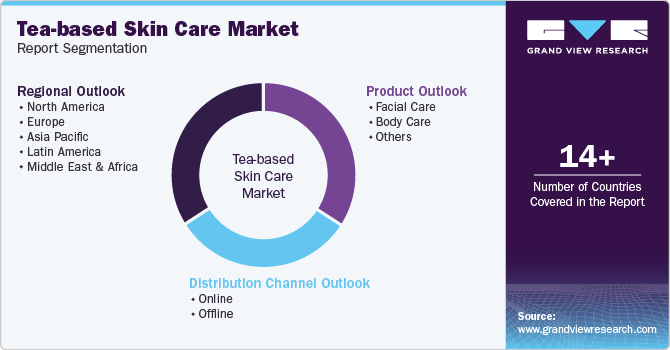
-
Product Outlook (Revenue, USD Million, 2018 - 2030)
-
Facial Care
-
Body Care
-
Others
-
-
Distribution Channel Outlook (Revenue, USD Million, 2018 - 2030)
-
Online
-
Offline
-
-
Regional Outlook (Revenue, USD Million, 2018 - 2030)
-
North America
-
U.S.
-
Canada
-
Mexico
-
-
Europe
-
Germany
-
UK
-
France
-
Italy
-
Spain
-
-
Asia Pacific
-
China
-
Japan
-
India
-
Australia & New Zealand
-
South Korea
-
-
Latin America
-
Brazil
-
-
Middle East and Africa (MEA)
-
Saudi Arabia
-
-
Frequently Asked Questions About This Report
b. The global tea-based skincare market was estimated at USD 258.9 million in 2024 and is expected to reach USD 258.4 million in 2025.
b. The global tea-based skincare market is expected to grow at a compound annual growth rate of 7.5% from 2025 to 2030, reaching USD 399.5 million by 2030.
b. Asia Pacific dominated the tea-based skincare market with a share of 33.6% in 2024. A longstanding tradition of tea consumption drives regional growth, and its well-documented health benefits have naturally extended to tea-based skincare products.
b. Some of the key players operating in the tea-based skincare market include Amorepacific, Lu Ming Tang, ORGANIC TEA COSMETICS, Natura&Co, L'Oréal S.A., Avon, Unilever, 100% PURE, SkinYoga, ArtNaturals.
b. Key factors driving market growth include the rising demand for clean and sustainable beauty products as consumers seek formulations free from synthetic chemicals and preservatives, and rising awareness regarding the antioxidant, anti-inflammatory, and anti-aging properties of tea extract, which is expected to propel its application in cosmetics and skincare products.
Share this report with your colleague or friend.
Need a Tailored Report?
Customize this report to your needs — add regions, segments, or data points, with 20% free customization.

ISO 9001:2015 & 27001:2022 Certified
We are GDPR and CCPA compliant! Your transaction & personal information is safe and secure. For more details, please read our privacy policy.
Trusted market insights - try a free sample
See how our reports are structured and why industry leaders rely on Grand View Research. Get a free sample or ask us to tailor this report to your needs.










